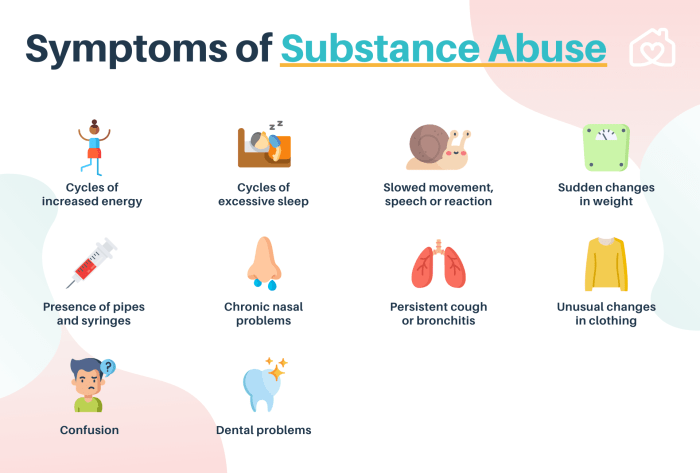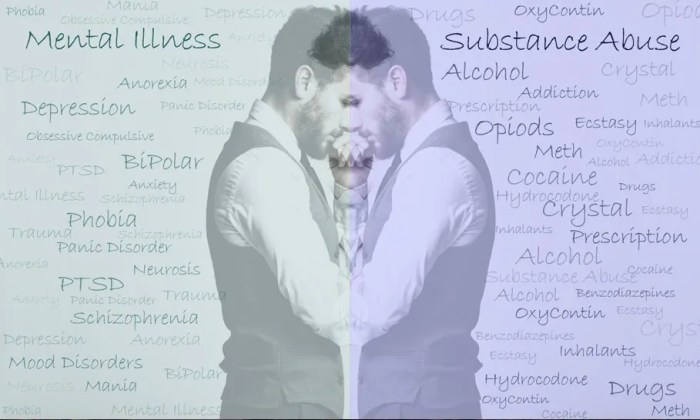As Mental health and substance use takes center stage, this opening passage beckons readers with liputan6 author style into a world crafted with good knowledge, ensuring a reading experience that is both absorbing and distinctly original. Mental health and substance use are inextricably linked, influencing each other in a complex dance that affects millions worldwide.
This article delves into the depths of this relationship, exploring the causes, consequences, and paths to recovery.
From the interplay of genetic predispositions and environmental triggers to the challenges of assessment and diagnosis, we unravel the intricate tapestry of mental health and substance use disorders. We examine the spectrum of treatment options, from evidence-based therapies to innovative medications, and highlight the crucial role of recovery and prevention strategies.
Mental Health and Substance Use: An Overview
Mental health and substance use are closely intertwined. Individuals with mental health disorders are more likely to engage in substance use, and vice versa. This co-occurrence can have severe consequences, as it can worsen the symptoms of both conditions and make treatment more challenging.
Co-occurring disorders are highly prevalent, affecting a significant portion of the population. Studies have shown that up to 50% of individuals with a mental health disorder also meet the criteria for a substance use disorder, and vice versa.
Causes and Risk Factors

The underlying causes of mental health and substance use disorders are complex and multifaceted. They involve a combination of genetic, environmental, and social factors.
- Genetic factors:Studies have identified genetic variants that increase the risk of developing mental health and substance use disorders. These variants may affect the brain’s neurochemistry, making individuals more susceptible to these conditions.
- Environmental factors:Adverse experiences in childhood, such as trauma, abuse, or neglect, can increase the risk of developing mental health and substance use disorders. These experiences can disrupt brain development and make individuals more vulnerable to addiction.
- Social factors:Social isolation, lack of support, and exposure to violence or poverty can also contribute to the development of mental health and substance use disorders. These factors can create stress and adversity, which can lead to unhealthy coping mechanisms.
Assessment and Diagnosis
Assessing and diagnosing mental health and substance use disorders is crucial for appropriate treatment and recovery. Various methods are used to evaluate these conditions:
- Clinical interviews:Mental health professionals conduct in-depth interviews with individuals to gather information about their symptoms, history, and current functioning.
- Psychological tests:Standardized psychological tests can help assess symptoms of mental health and substance use disorders, as well as identify underlying personality traits or cognitive impairments.
- Physical exams:Physical exams can help rule out any medical conditions that may be contributing to mental health or substance use symptoms.
- Laboratory tests:Laboratory tests, such as blood tests or urine tests, can detect the presence of substances in the body or identify any medical conditions that may be related to mental health symptoms.
Treatment Options, Mental health and substance use

Treatment for mental health and substance use disorders involves a range of interventions tailored to the individual’s needs. These interventions may include:
- Psychotherapy:Psychotherapy involves talking with a trained mental health professional to address the underlying causes of mental health and substance use disorders. Cognitive-behavioral therapy (CBT) and motivational interviewing are common types of psychotherapy used to treat these conditions.
- Medication:Medications can be used to manage symptoms of mental health and substance use disorders. Antidepressants, antipsychotics, and mood stabilizers are commonly used to treat mental health disorders, while medications such as methadone and buprenorphine are used to treat substance use disorders.
- Inpatient treatment:Inpatient treatment involves staying in a hospital or residential facility for a period of time to receive intensive treatment for mental health and substance use disorders. This level of care is often necessary for individuals with severe symptoms or who require a structured and supportive environment.
- Outpatient treatment:Outpatient treatment allows individuals to receive treatment while living at home. This level of care is often less intensive than inpatient treatment and is suitable for individuals with milder symptoms or who have a strong support system.
Closing Summary: Mental Health And Substance Use

Mental health and substance use disorders pose formidable challenges to individuals, families, and societies. Yet, amidst the complexities, there is hope. This article has shed light on the multifaceted nature of these conditions, emphasizing the need for comprehensive approaches that address both mental health and substance use.
By fostering understanding, reducing stigma, and investing in accessible and effective interventions, we can empower individuals to reclaim their well-being and build healthier communities.
Detailed FAQs
What are the common signs and symptoms of mental health and substance use disorders?
Signs and symptoms vary depending on the specific disorder, but common indicators include changes in mood, behavior, thinking, and physical health.
How can I support someone struggling with mental health and substance use issues?
Offer empathy, understanding, and non-judgmental support. Encourage them to seek professional help and connect them with resources.
What are the benefits of early intervention for mental health and substance use disorders?
Early intervention can improve treatment outcomes, reduce the severity of symptoms, and prevent long-term consequences.